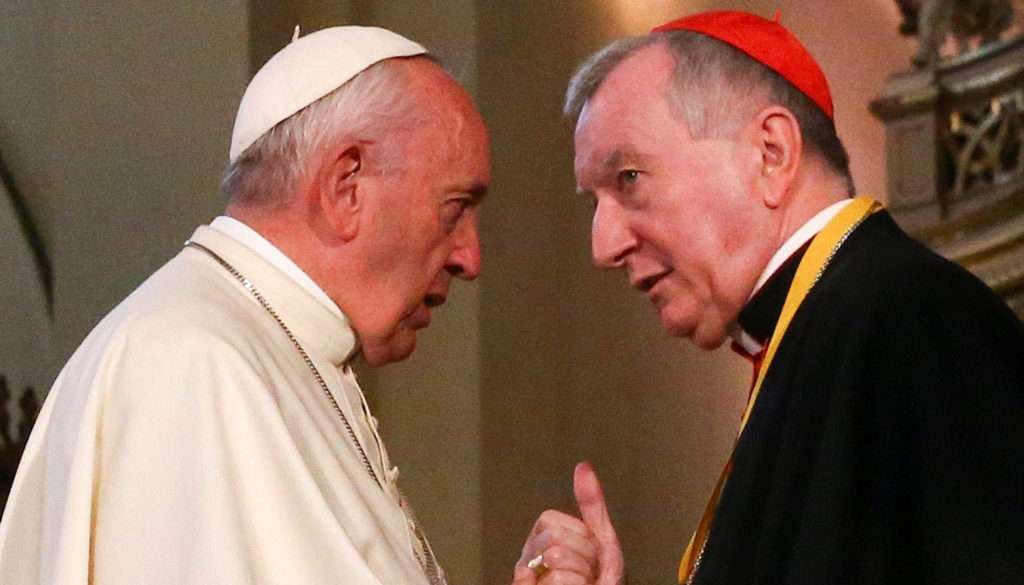ROME — When it comes to leadership and governance, the old adage that “personnel is policy” is true of just about everyone — including popes.
As a pontiff with a very clear set of pastoral and political objectives, Pope Francis in particular speaks volumes with whom he chooses to represent him — both officially and unofficially.
Over the last 11 years of his pontificate, Francis has shown a preference for messengers able to move the needle on important points of policy by stepping outside of convention and traditional power structures.
Francis tends to operate in an indirect and roundabout way, appointing what are essentially placeholders to traditional seats of power while giving more influence to people he sees as trustworthy confidants, regardless of whether they are formally part of the system.
In fact, some of those who play the most crucial roles in advancing papal policy under Francis don’t necessarily hold any diplomatic office, and have never been a part of the Vatican’s official diplomatic corps. The question, then, is perhaps not so much who the most important Vatican diplomats are, but who are the most important people involved in Vatican diplomacy.
Here’s a look at five officials, not in any specific order, who seem to hold the most sway right now when it comes to the Vatican’s diplomatic endeavors.
1) Cardinal Pietro Parolin
Regardless of everything stated above, one of the most consequential Vatican diplomats has been, and remains, the Vatican’s Secretary of State, Italian Cardinal Pietro Parolin, though not for the reasons one might expect.
Parolin has been Francis’ secretary of state since October 2013 — almost the entirety of the pontificate. From the beginning, Parolin has been a close papal confidant who, among other things, was among the chief architects of the Vatican’s China policy and its controversial 2018 provisional agreement with China on bishop appointments.
But as the years have passed, Francis has depended less and less on Parolin for key policy moves. While leaving him in his position, Francis has appeared to bypass him by entrusting special projects and initiatives to close allies outside the system.
Still, he’s remained a strident, even outspoken defender of Francis’ foreign policy stances.
For example: While the pope has tried to strike a balanced tone in public remarks about Israel’s war with Hamas, Parolin has pulled no punches, repeatedly calling for a two-state solution to the Israel-Palestine conflict and recently coming under fire by the Israeli Embassy to the Holy See for saying Israel’s response to Hamas’ surprise Oct. 2023 attack was “disproportionate.” Israel called those remarks “regrettable” (which was translated into Italian as the more forceful “deplorable”).
As one of the pope’s most visible representatives, Parolin is still seen as a diplomatic heavyweight in the Vatican, meaning that when he speaks, his counterparts are listening.
However, Parolin also carries added weight in that he is increasingly seen as papabile, a likely papal candidate in the next conclave, by moderates and conservatives in the Church who are in favor of general continuity, but who are perhaps looking for someone a bit calmer and more predictable.
2) Cardinal Matteo Zuppi
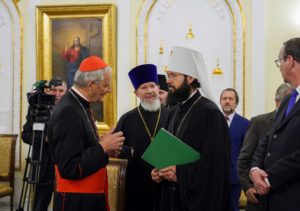
Though not formally a part of the Vatican’s diplomatic corps, Italian Cardinal Matteo Zuppi, the archbishop of Bologna and president of the powerful Italian bishops’ conference, is undoubtedly a key player in the Holy See’s diplomatic affairs.
A close papal ally broadly seen as being tanto papabile, Zuppi as a young priest helped the Vatican negotiate the Mozambique peace accords in 1992 through the Sant’Egidio Community, an ecclesial movement dedicated to social issues, and which is involved in diplomatic peacekeeping efforts.
Zuppi is a member of Sant’Egidio, Francis’ favorite of the new movements, and last year was tapped as the pope’s envoy to look for possible pathways between Ukraine and Russia.
While the Vatican doesn’t seem poised to play a major role as mediator in the conflict so far, Zuppi’s humanitarian efforts — like assisting in the return of Ukrainian children deported to Russia — can be considered successes.
Zuppi is increasingly seen as a close papal confidant with a growing list of credentials that makes him an attractive candidate for many continuity voters in the next conclave. When he speaks, it’s assumed that he accurately represents the mind of the pope.
3) Cardinal Christophe Pierre
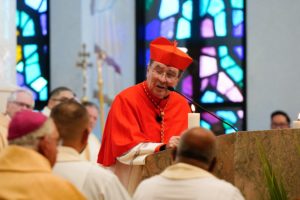
At 78, French Cardinal Christophe Pierre is already three years past the traditional age of retirement for cardinals and bishops, but remains in his role as apostolic nuncio to the United States. Francis gave him a red last September, making him one of few nuncios to bear the status of cardinal.
Since 2016, Pierre has had the tough job of serving as a bridge between Francis’ Vatican and the United States amid impressions of a growing rift between the progressive-minded pontiff and conservative American Catholics uncomfortable with many of his decisions.
It is no secret that Francis has a chip on his shoulder when it comes to Americans. He has frequently condemned market capitalism, singled out the U.S. for its high volume of carbon emissions, and pointedly dismissed his American critics as “reactionary.”
Pierre has insisted that there is no “great divide” between Francis and the American church and has assured that the pope loves the United States, chalking up any disagreements to broader societal polarization.
But it’s no secret that some of Francis’s most vocal critics are from the U.S., so getting his message across to a skeptical church with outsized financial and political influence is a delicate task, and one Pierre has done well enough to earn him both a red hat, and an increased profile as papabile for the continuity crowd.
4) Cardinal Stephen Chow
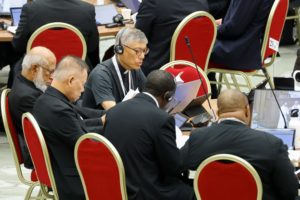
One of Francis’ most glaring priorities from the outset has been the Vatican’s engagement with China.
Apart from sticking by the Vatican’s controversial 2018 agreement on bishop appointments with the Chinese government, he’s also gone out of his way to deliver calculated and timely accolades, including a very visible shout-out to the “noble Chinese people” during his visit to Mongolia last September.
Without any formal diplomatic presence in mainland China, Francis’ point man on engagement with Chinese officials is Cardinal Stephen Chow, a fellow Jesuit who serves as the bishop of Hong Kong.
Like Zuppi, Chow is not officially part of the Vatican’s diplomatic corps. But he is responsible for advancing one of the most important foreign policy agendas of this pontificate, striving to make Hong Kong a “bridging church” between China and the Vatican.
Chow made a historic visit to Beijing last April, and then in November welcomed Beijing Archbishop Li Shan to Hong Kong, marking the first in what Chow said he hoped would be an ongoing exchange of visits to help both churches get to know one another better.
China will likely remain a key agenda item for Francis, meaning Chow will have an important role to play as long as he serves in Hong Kong.
5) Cardinal Mario Zenari
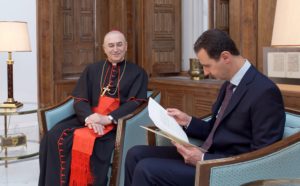
Although Italian Cardinal Mario Zenari, apostolic nuncio to Syria, has somewhat fallen off the radar in recent years, he remains one of the Church’s most important regional actors.
Appointed to the job by Pope Benedict XVI in 2008, Zenari has been there for the entirety of the country’s catastrophic civil war, which began in 2011 and continues to cripple much of its population.
Francis made Zenari a cardinal in 2016, when the war was generating intense international interest. Today, he is seen as one of the most authoritative Vatican voices on Middle Eastern affairs, and for many suffering locals, he is a sign of hope.
Zenari is among the biggest names on the diplomatic scene to call for an end to international sanctions against Syria, and one of the biggest promoters of rebuilding and fundraising efforts in the country.
Zenari continues to travel and speak on various panels and events throughout the world to raise awareness of Syria’s ongoing woes, and he remains a primary point of reference for Francis and the Vatican on the Church’s Middle East policy.
